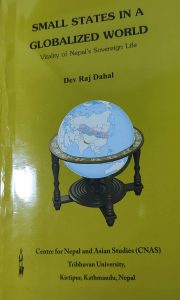Professor Dev Raj Dahal
Senior Political Scientist, Nepal

Begin text.
Nepal’s vertical landscape offers different climatic zones-tundra, temperate and tropical. It ranks 255 positions in biodiversity which can serve as the basis of sustainable development. It hosts 2.5 percent of share in global biodiversity. Bioclimatic variations offer reasonable economic scope for the diversification of production, ecotourism, green business and herbal goods. The great snow-capped Himalayas are the source of freshwater and clean energy. It is a public good that is vital for the survival of all living species. But 20 out of 200 Himalayan glaciers are at risk of blowing up at any time.
The Global Index of Natural Disaster ranks Nepal as the fourth highly vulnerable state in ecological hazards occupying 11th in seismic risk and 13th in flood position. In this context, without building partnership with nature and looking for other sources to exploit to balance trade deficits other than natural resources will violate the Environment Protection Act and only foster fragile, lopsided progress. The climate crisis forces the states both big and small to discard the notion of the limitless potential for carbon-intensive class blind economic growth to participate in the global economy because more growth means more CO2 emissions causing environmental destruction. It entails diffusing climate-friendly modern technologies through global networks of industry, capital flows, research and development and enable even the government of small states to ease monitoring and boost accountability and transparency on the implementation of climate adaptation plans.
The basic premise behind a nation to benefit from an open economic policy of globalization is the belief that “the process generates employment for a large number of people, that is, the labor market is practically not closed and that other countries also follow the rules of its game” (Acharya, 2013: 4) on sustainable development. Yet, three vital policy pillars of globalization: “privatization of the public sphere, deregulation of the corporate sector and lower corporate taxation, paid for with cuts in public spending” (Klein, 2014: 48).
It is not caring about the climate, leaving an imbalance of supply and demand and rendering service delivery in dismal condition. The market-focused education, health and communication of Nepal that have dichotomized citizenship rights and privileges into public and private continue to destroy the emotional solidarity of netizens and citizens for national cohesion and “erode the sense of community” (Sandel, 2012:125) embedded in ecology for its survival and progress. The amelioration of this condition requires a rethinking of sustainable development and restoring Nepal’s classical ideal to foster ecological, social, gender and intergenerational justice.
Nepal’s survival dynamism from the classical period of human history to the recent past is associated with the wisdom of its ecological policy of thoughtful partnership with nature. There is deeper Nepali folk wisdom “Green forest, Nepal’s wealth” which provides awareness to modernized elites’ temptation, habit and profit to plunder the natural wealth of the nation endlessly and freely producing what Garret Harding calls” tragedy of the common.” It is swelling the ecological deficits, killing the self-sustaining ecosystem and touching every aspect of the nation’s social, economic and political institutions.
Nepalis are living in a society of increasing population and decreasing natural resources. Continuous efforts by people to satisfy their survival, development and commercial needs are damaging mountains, pastures, forests and sources of water on which they depend for their sustainable livelihoods.
Excessive consumption of fossil energy, deforestation and desertification are alarming for the nation, giving dawning consciousness of Nepalis’ relations with the vital forces of nature and different orders of life-plants, insects, birds and animals linked to each other within life’s cosmic web. It is defining an option for a common future. Nepal has accepted the recommendations of various Climate Change Summits and formulated adaptation plans to balance environmental and development needs. How can a symbiosis of politics, economy and ecology contribute to the security of human freedom, food and habitat? Can the environmental cost of production such as pollution, carbon emission and depletion of the ecosystem be included in its development policy so that a quest for human security does not undermine the natural basis of this small state?
The mountain regions of the Himalayas, whose environmental system and resources are very important for the densely populated Gangetic plain, are vulnerable in ecological terms. The region’s average temperature has increased by 1.
2 degrees Celsius and could get warmer with 2 degrees Celsius by 2030. The overall monsoon rainfall indicates a decrease and low aggregation of snow in the Himalayas.

This environmental change has brought four critical challenges to conventionally defined state-centric security: First, the effects of climate change transcend domestic and foreign policy boundaries of the state. Now security studies require planetary awareness and its linkages with various life-world and non-life sub-systems. Second, the realpolitik approach to national security planning is insufficient. Human survival requires a judicious balance between the awareness of human freedom and nature’s level of tolerance to it. This means cooperation and surveillance among the affected states and people can stem its negative spill-over effects unleashed by the corruption of the free human will. Third, the risk of mutual vulnerability to climate change requires mutual security through collective action. Finally, governance of climate change—both policy formulation and implementation entails national, regional and international framework beefed up by the states, non-state and transnational actors and their mutual accountability in burden sharing and policy coherence.
Since environmental challenges do not care about human made national borders, what is required for its solution is comprehensive security.’ Future conflicts go beyond state centric security limits if one refuses to acknowledge systemic ties with the society, environment and future generations.
Development based on rational choice of powerful ones discounts both the social costs for society and the ecological costs for common Earth. Garrett Hardin argues, “Freedom in a common brings ruin to all (1968).” In such a context, small states and weaker sections of society have to bear more risks because they possess limited means to defend themselves. A development that does not recognize the limits to natural resource exploitation and is not amply system sensitive brings insecurity to all. Environmental degradation and poverty are closely tied to an intricate system of cause and effect.
Without a certain amount of democratic equity to all Nepalis, poverty fuels the source of insecurity and imposes challenges to the environment, society, political order, stability and peace. Neither environmental challenges can be addressed by military means nor can it be resolved in isolation from the rest of development policies-local, national and international unless a balance is struck between the regulative capacity of the Earth’s thermostat and the farsighted self-control of human beings.
Deforestation of Nepali mountains, for example, causes flood havoc each year in Terai, India and Bangladesh. The sovereignty of the state does not offer security to people engaged in agriculture, industry and trade. When environmental security is transnational in nature, national separateness cannot alone become a rational solution. Coordination of national, regional and international policies is essential to respond to climate change. The partnership with nature in a wider sense requires reviewing a wide range of consequences of climate change for human livelihoods, insecurity of monsoon predictions affecting agriculture, hydropower, disease pattern and subjective insecurity in facing the future with confidence.

The implications of climate change have also direct and indirect effects on violent armed conflict of different kinds such as human displacements, migration, interstate war, civil war, non state group conflict and political instability.
Nepal has already experienced the effects of climate change in areas like loss of Himalayan glaciers, shortage of water supply, the danger of glacial lake burst of the sort of Chho Rolpa, extreme weather events, fragile ecosystem, urban pollution, deforestation, over digging of rivers, mountains and rocks for sand and stones in Churia hills causing soil erosion, lowering of water level, floods damaging fertile lands etc.
They are eroding natural shields affecting production and food supply. Vulnerable regions require a high level of resource investment in adaptation measures. The emission of greenhouse gases from Nepal is small.
It has considerable opportunities to attract foreign investment in the Clean Development Mechanism project including hydropower development to meet domestic needs of energy and irrigation and respond to demand for power in energy-starved northern India. Participation of local citizens in green growth, the substitution of non-renewable energy by renewable ones such as solar, bio gas and wind, energy-saving and efficiency, dematerialization of production and judicious use of resources for consumption can contribute to sustainable development in Nepal.
A cooperative approach to development assures mutual security of the rich and the poor.
An entirely anthropocentric approach to development is somewhat outdated as global climate change requires a global policy response which a small and weak state like Nepal alone cannot cope with. The survival of spaceship earth demands the priority of global common interests over the petty and parochial ones.
End text.
Text courtesy: Excerpts from the recently published book, (2022) “Small States in a Globalised World”, by Centre for Nepal and Asian Studies (CNAS), Tribhuvan University, Kirtipur, Kathmandu, Nepal.
# The entire editorial board of the telegraphnepal.com is highly indebted to the senior political scientist of Nepal, Professor Dev Raj Dahal and the Executive Director of the CNAS Dr. Mrigendra Bahadur Karki.
# published in the larger interest of the global audience: Chief Ed.
Our contact email address is: editor.
telegraphnepal@gmail.com
